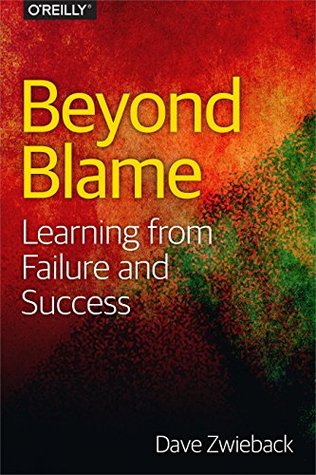Kindle Notes & Highlights
“Accountability and punishment are mutually exclusive.”
“Holding someone accountable,” Bill said, “means having them provide a full account of what happened. Full accountability is not possible with blame. We can only pick one — accountability or punishment.”
“Learning from both failures and successes. Feeding these learnings as signals back into the system, which will change and adapt to this new information.
“E.T.T.O. is efficiency-thoroughness trade-off.
“Hollnagel noticed that you can’t have both efficiency and thoroughness, and that we have to continually balance between the two.
That’s just the hindsight bias talking, and it’s tricking you into thinking that something that is obvious now was also obvious then.
“Anytime you hear ‘didn’t,’ ‘could have,’ ‘if only,’ or ‘should have,’ you can be pretty sure that whoever is saying them is under the influence of hindsight bias. These phrases are called ‘counterfactuals’
are all evidence of hindsight bias.
if we get stuck there when investigating past events, we never fully understand what really happened,
as long as we attribute their behavior to their conditions, we’re good. The moment we attribute it to their personality, we’re making fundamental attribution error.
Kahneman, for one, is not optimistic about our ability to spot them in ourselves. Which is why it’s important for us to learn to spot them in one another, as well as give each other permission to name the biases when we see them.”
When trying to learn from the things that happened in the past, we have to mentally transport ourselves to the past, and continually ask ourselves, ‘What was known at the time? How did the decision make sense? What circumstances were influencing my decisions? What conditions were present that enabled me to act in a particular way? How did I know what I knew, and how did I do what I did?’
Who knows what types of risks are not being disclosed when people are afraid to speak up.”
provide a full account of what happened. That’s the real meaning of ‘accountability.’”
“Cover your ass better. That’s the main skill we learned. Not how to make our systems or organizations more resilient.”
Blame is the frigid, arctic air that stunts the development of a deeper understanding of our systems,
Being accountable is accepting responsibility for our actions, and providing the full account, without accepting the blame.
“We have plenty of experts, but they’re not working together much. And they’re not focused on the whole system — only their own parts.
We talk a lot about making the firm a ‘learning organization’ — well, here’s a very concrete step we can take to maximize learning. We want our employees to innovate? Being able to fail in a safe way and learn from it will encourage more innovation.
It’s a paradigm shift, and it does require courage and leadership.
Assuming you’re working within a complex system is probably a safe default. Most of the time we don’t know how our systems are working, and whether the changes we’re making will work or backfire. But we can experiment in safe-to-fail ways, and find out more about the constraints of our systems. We can develop heuristics about how to act within them. And, with some luck, we can move these systems into the more predictable and ordered domains by adjusting the constraints. This is something that humans are quite good at.”
the ‘learning review,’
“Fundamentally, in a learning review, we recognize that we’re most likely working with a complex system, which requires a different approach than working with other types of systems. We know that in complex systems, the relationship between causes and effects can be teased out only in retrospect, if ever. We’re also not looking for a single root cause. Instead, we hope to understand the multitude of conditions, some of which might be outside our control. We also accept that some of the conditions will remain unknown and unknowable.
“We also want to learn not just what went wrong,” Ollie said, “but what went right — what usually goes right. We’re typically overly focused on failures, forgetting that the same systems — including the people working in them — produce both positive and negative outcomes.
In either case, the relationship between cause and effect cannot be established in real time. Experience is not useful here. If we’re in the chaotic domain, the right thing to do is just to act — to do something and see what happens. If we’re in a complex
Knowing the root cause, we no longer seek it, and instead look for the many conditions that allowed a particular situation to manifest. We accept that not all conditions are knowable or fixable.
We seek to understand why it made sense for people to do what they did, given the information they had at the time.


